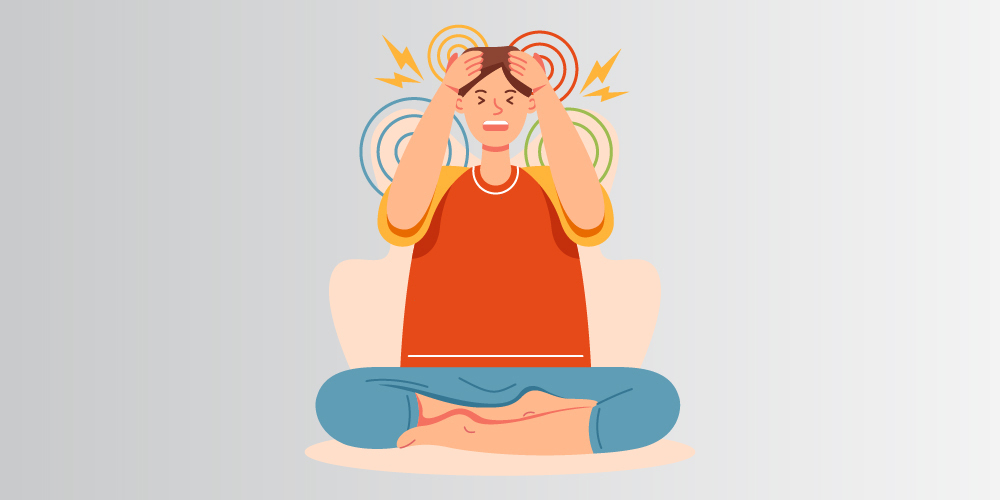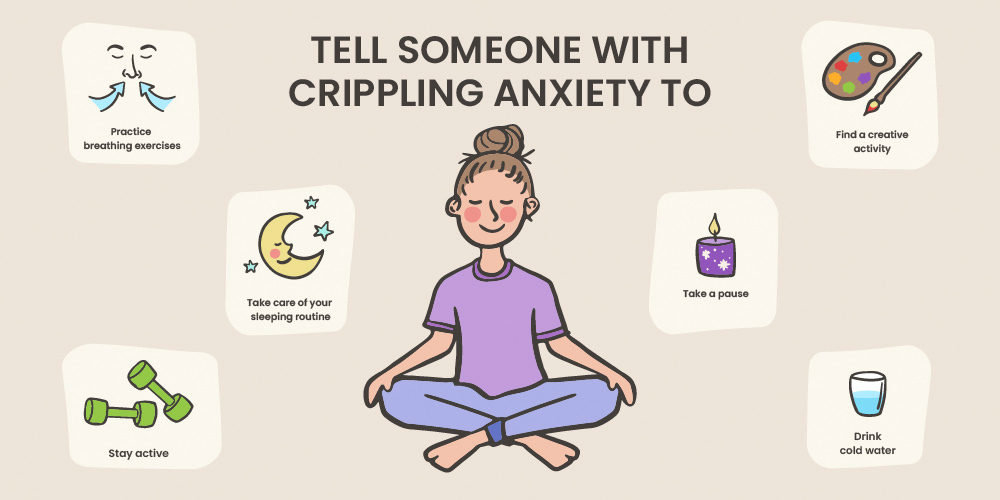Last Updated on August 23, 2024
Introduction
Talking about crippling anxiety and how it feels is difficult to put into words. It is an extreme form of anxiety that becomes so intense it disrupts daily life and the ability to carry out regular tasks. It can manifest as overwhelming agitation, irritability, insomnia, racing thoughts, and even physical symptoms such as muscle pain, difficulty breathing, and dizziness.
Dealing with it can be challenging; however, this blog will cover what crippling anxiety is, its signs, causes, and how to manage it. Keep reading to learn more.
What is Crippling Anxiety?
Crippling Anxiety is not a clinical diagnosis, but a term commonly used to describe intense anxiety or an anxiety disorder.
Unlike typical stress or nerves people experience in daily life, such as feeling anxious before a presentation or speaking in public, severe anxiety extends beyond these normal reactions. When anxiety becomes persistent and disrupts one’s ability to manage daily tasks or fully engage in life, it may indicate an anxiety disorder, such as crippling anxiety.
Signs of Crippling Anxiety
This condition often presents a consistent set of symptoms, regardless of its underlying cause. If someone suspects that they are dealing with this form of anxiety, the following symptoms may resonate with them.
Crippling anxiety may manifest with the following signs:
- Social withdrawal or avoiding social interactions
- Unexplained weight fluctuations
- Intense irritability or mood swings
- Difficulty falling asleep or frequent awakenings
- Restlessness or an inability to remain calm
- Physical complaints like headaches or body aches
- Digestive issues such as nausea or stomach discomfort
- Strained relationships
- Substance misuse
- Acting out, aggressive behavior, or a quick temper
- Suicidal thoughts
- Persistent worry or racing thoughts
- Struggling to manage daily responsibilities
- Dizziness or feeling lightheaded
- Breathing difficulties or chest tightness
Also read: Understanding Existential OCD
What Does Crippling Anxiety Feel Like?
Crippling anxiety can be overwhelming and draining, both mentally and physically. It feels like being trapped in a constant state of fear or dread, where even the simplest tasks seem unachievable. Physically, it may manifest as tightness in the chest, shortness of breath, or a racing heart. One might experience a knot in the stomach, and the mind may race with worst-case scenarios, making it difficult to concentrate or think clearly.

Emotionally, it can create a profound sense of isolation, as if no one else understands what one is going through. It can foster self-doubt, leaving one feeling powerless and out of control. Every decision or action can become a source of intense worry, leading to avoidance and withdrawal from activities once enjoyed.
This form of anxiety can leave one completely exhausted, drained, and desperate for relief, yet unsure of where to turn. It is not to be confused with mere nervousness; rather, it is an all-consuming experience that affects every aspect of one’s life.
Also read: Intrusive VS. Impulsive Thoughts
How to Help Someone with Crippling Anxiety?
Supporting someone with this condition requires patience, understanding, and a lot of love. It is important to be there for them without judgment, offering a listening ear and a comforting presence. Gently encourage them to express their feelings, reassuring them that they are not alone in their struggle. Small gestures of kindness, like a reassuring touch or a calming word, can make a big difference.
Sometimes practicing deep breathing or simply sitting in silence when words feel too heavy can be therapeutic. The following tips can provide much-needed clarity on relaxing their thoughts and making them feel understood.

Effective Coping Strategies for Crippling Anxiety – What You Need to Know
| Strategies | Description |
|---|---|
| Journaling Thoughts | Writing down what’s causing anxiety and how one feels can help process and understand emotions. |
| Staying Socially Connected | Calling a friend or meeting someone for coffee can provide support and reduce feelings of isolation through social interaction. |
| Establishing a Sleep Routine | Going to bed and waking up at the same time every day can improve the management of anxiety by creating a consistent sleep schedule. |
| Reminding Yourself It’s Temporary | Self-affirmation is important. Anxiety is intense, but it won’t last forever. Remind yourself that time will pass. |
| Staying Present | When anxiety pulls into worrying about the future or the past, gently bring focus back to the present moment. |
| Enrolling in Research at Revive | Revive Research Institute offers multiple clinical trials that may help find potential solutions for panic disorder, anxiety disorders, and other mental health issues. |
These are simple coping strategies, but for more severe cases, it’s important to consult a healthcare professional.
The Takeaway
Dealing with crippling anxiety can feel overwhelming and all-consuming, making it difficult to manage daily tasks and enjoy life. However, there are strategies that can help, such as practicing mindful breathing, engaging in calming activities, and focusing on physical health.
Various clinical research organizations offer potential ways to manage anxiety. By enrolling in a research study, one not only gains access to new and potentially effective treatments but also contributes to advancing mental health research that could benefit others. Remember, no one is alone, and there are ways to find relief and support.




